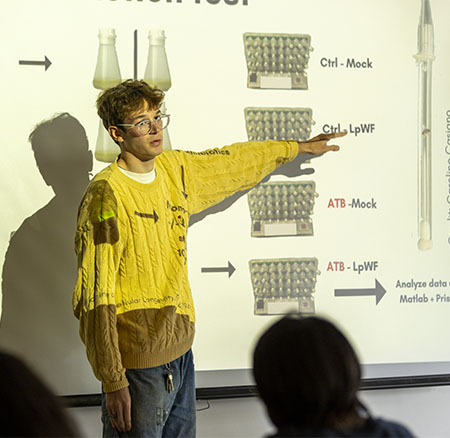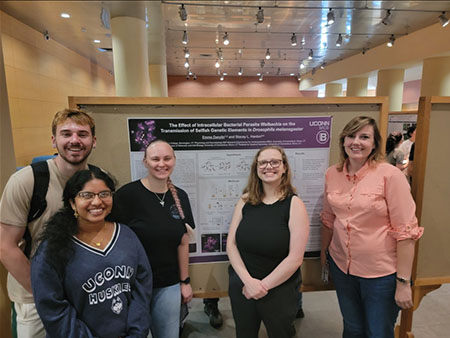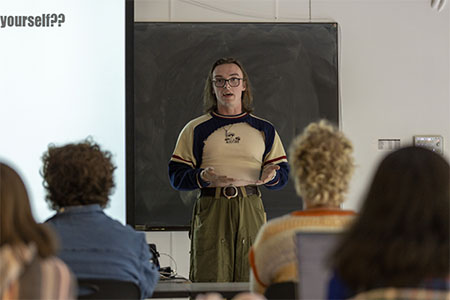An Excellent Research Partner: The Fruit Fly
Three students presented their research experiences working with Drosophila: the common fruit fly. As varied as their research was, each agreed that fruit flies are a great model organism. Each exemplified the perseverance required in scientific research, and all would encourage students to apply for research experiences.
I (heart) Drosophila.
For the three students who shared their summer experiences, “I (heart) Drosophila” could be a bumper sticker.

“Scientists like to control things,” said Charles Pfeiffer ’25, who used fruit flies to study the effect of probiotics on the gut-brain axis with The Dra. Imilce Lab at the University of Puerto Rico, Rio Piedras, as a part of the National Science Foundation’s (NSF) Research Experiences for Undergraduates (REU). “Fruit flies offer a lot of benefits in terms of providing experimental controls," he added.
They have really quick regeneration times. Within 10 days, scientists can have a whole new generation of flies, Pfeiffer explained. And they have more in common with humans than you would expect; fruit flies and humans share about 60% of their genes. That makes them a great model organism for experiments, the results of which might be useful in discovering something significant about human biology.
Fruit flies also age quickly, said Thomas Evans ’24, who worked as a lab tech in the Primislow Lab at the University of Washington. Though this job was not a part of the REU program, Evans had a job at the same lab last year and was invited back to continue their research. They study the relationship between fat, sex, and feeding patterns among fruit flies.
“They have really malleable genetic structures,” Evans said. “So we don’t have to torture humans or wait for them to get really old to see what happens if we mess with their genome.”
Fruit flies are inexpensive too, and Pfeiffer shared, “you can incapacitate them with CO2 and make them faint and move them anywhere you want.”

Emma Danylin ’25 spent the summer working within the University of Connecticut’s Hanlon Lab as a part of an NSF REU. The lab, a part of the university’s molecular and cellular biology department, studies chromosome formation and evolution, particularly the segregation of B chromosomes during cell division. Danylin’s task was to study the effect of Wolbachia, an intracellular bacterial parasite found across insect species, on the transmission of B chromosomes.
“I definitely like working with Drosophila a whole lot,” said Danylin. “They are a great model organism; that’s why they are used so often.”
Never-ending perseverance
Part of Danylin’s job included dissecting female fruit flies and snipping their ovary tips, which have a high number of imageable chromosome spreads. As an indication of the scale, a fruit fly egg is 0.5 mm long and can't be seen without magnification. Danylin was worried that their shaking hands would prevent them from being able to dissect.
But they said, “at some point, it just clicked. I found a way to [dissect] that negated [the shaking] in a way.” They continued, “I found dissecting to be really fun, despite being challenging.”
Danylin found that the transmission rate of B chromosomes was an average of 71 percent among flies not infected with Wolbachia and 58 percent for those that were. Though this difference was not statistically significant, the Hanlon lab hopes to repeat the experiment with a larger sample size and, perhaps, to include measurements of the intensity of the infection and other factors.
Inconclusive experiments are much more common than conclusive ones. Successful scientists develop useful ways of recharacterizing failure and continuing to find excitement in the process.
Pfeiffer’s experiment aimed to pinpoint any connection between probiotics and sleep. The lab is hopeful that study in this area can decrease sleep-associated anxiety and depression and help people live longer and happier lives. The question underlying the hypothesis was, “will the flies supplemented with the Lactibactiplanti Bacillus probiotic experience decreased time needed to fall asleep, increased total sleep, and/or decreased locomotion?"
The group treated with the probiotic experienced significantly decreased sleep, decreased total sleep, and increased locomotion.
“It shows the exact opposite phenotype, which is very interesting, and I don’t know if I can tell you why,” he said.
Replicating an experiment that has been used to determine depression in mammals, Pfeiffer accidentally killed all but seven of his flies.
“I am not one of those people who gets everything on the first try, and this was my first try,” he said. “The REU experience really challenged me to think more like a scientist.”

Similarly, Evans’ research included emotional highs and lows. They were elated when they found statistical significance between the fat level and the feeding level.
“I went crazy. This is wild. This is insane. There is something there,” Evans recalled.
When they manipulated the data to negate the impact of weight, they were hopeful that they would see a correlation. “Everyone in the lab was like, ‘we are going to see it. It’s going to be great.’” But instead, the graph showed no relationship.
“I was very sad. I looked at it for a long time, and a friend looked at it, and we had a discussion.”
They talked about the the other mathematical models that they could use to reveal relationships just barely outside the periphery of current understanding.
“Hope is not lost,” Evans said. “There is a chance that there is still something happening…so I am going to keep working with [my lab] to see whether I can find something relevant.”
Research Opportunities at Bennington
The NSF’s REU is a highly competitive and selective program that gives undergraduates the chance to conduct research at major research institutions around the country. Some opportunities under the REU program are receiving hundreds of applications but only accepting a few students, according to Blake Jones, Biology faculty.
“These aren’t summer courses or science fair projects,” said Jones. “Students work on some of the most high profile and well funded research programs in the world, helping to push the boundaries of our scientific knowledge.”
Bennington has a high rate of success with Math and Science students receiving NSF REUs, “above what you would expect from your average small liberal arts college,” said Jones.
He attributes the acceptance rate among Bennington students to the type of students Bennington attracts and the individualized support they receive when they are here.
“Bennington students are not your average small liberal arts students,” he said. “They have a certain degree of motivation for discovery and curiosity that outshines [students at] most similar institutions.”
Jones continued, “These students maximized their opportunities. Among the most important use of REU opportunities, that goes beyond learning new skills and gaining research experience, is building a professional network. These students have already made use of their network to find and create more opportunities beyond the REU experience itself, opportunities that are already shaping their future beyond Bennington."
Highly recommended
Danylin, whose program also featured professional development workshops, said, “working in the lab was definitely the best part of the experience for me. My boss and my peers really challenged me to do good work, and I found that I was really enjoying all of the different stuff I was learning, the techniques I was doing, getting to engage intellectually with my peers… I found it to be really engaging and super fun.”
They continued, “I found that being in this environment was helpful for me to see what working [in a lab] would be like. I really hope other students will do the same thing and have the same great experience I had.”
Pfeiffer appreciated the lab time as well as the off time.
“They pay you to travel and to see really cool places and to get really good experience. I got to go out and see a lot of really beautiful places and spend a lot of time swimming,” he said. “They really take good care of you.”
Evans, who plans to pursue a PhD in biology, said, “the part I really loved was the education piece. I know I am going to want to teach somehow, to teach in a way I want to be taught.” For students, their family members, and others, Evans likes “breaking down those barriers and making science enjoyable.”
Learn more about studying science at Bennington.